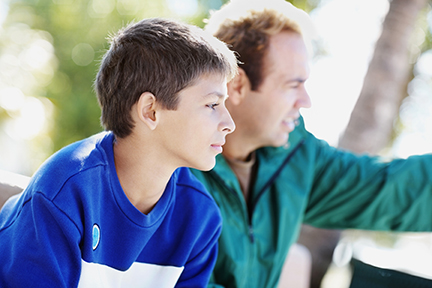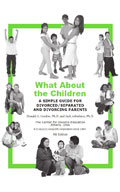
By Donald A. Gordon Ph.D. and Jack Arbuthnot Ph.D.
How to Help Your Teenager:
Provide consistent supervision.
Most parents need to improve certain parenting skills; this is true even if a marriage is solid. The preteen and teenage years present risks and challenges that can escalate, and family break-ups increase those risks. Teens resist parent control: they demand freedom and want to make their own decisions.
Lack of supervision is the best predictor of trouble. Parents need to learn to be involved. They must learn to supervise without causing too much conflict.
Don’t withdraw out of frustration.
Many single parents are tempted to let go of control in order to reduce the conflict. This often happens because the other parent is not there to give support, to help when they need a break, and to help think through a problem.
Encourage questions and give honest answers.
Good communication is a critical skill to develop after divorce and children can benefit from open communication. You must do more than just listen well – you need to also give feedback. Another critical skill is discipline, which requires patience, fairness, and consistency. Parents can learn effective methods to help teens, such as solving problems in family meetings and making agreements with teenagers. You need to make your expectations clear (in writing) and set consequences.
Parents need to learn skills to communicate well, which includes listening to their children in an active way and talking about their own feelings without blame. These are often called “I” statements: for example, if your teenager is upset and criticizes you, then you can say, “I feel hurt when you say those things” instead of, “You’re being a mouthy brat. You sound just like your mother (or father). Go to your room!”
Let children know that both parents can be right, both can be wrong.
By this age, children realize there are two sides to every story. Most of the time, they’ll be able to handle the lack of certain facts. Encourage them to ask questions, and give them honest and clear answers. Try to state your own views first, then you can try to state the other parent’s views. Try to be fair and neutral.
Let the children talk about their concerns with the other parent, and encourage them to ask the other parent questions. In this way, teens will feel less pressure to “choose sides” – they can begin to understand that each parent sees things differently and that there may be “truth” to both sides.
Avoid double standards in your behavior and theirs.
If the parents are honest, it will help re-build their children’s trust. This is very important. Teens know when a person is not honest – they know when a person is trying to manipulate them. They see double standards that young children do not see. Parents who are not open and honest run a real risk of losing the respect of their teens.
Parents can learn important skills for dealing with teens in an online program. One of these is called Parenting Wisely (see www.parentingwisely.com). In this program, parents select from several choices to solve challenges with teen behavior. They can view a video demonstrating each skill to see how these skills are used in everyday life. A little learning (3-4 hours) goes a long way. It will improve the parent-teen relationship and it will reduce the teen’s risk for behavior problems.
Encourage reasonable responsibilities in the family, but don’t overburden them.
We know teenagers can take on bigger duties in family life, especially if there are younger children in the family. But, in spite of the temptation to do so, parents must not rely on their children for emotional support. Some teens can do a good job of helping a depressed and insecure parent, but this is a major burden for a child. They may not be able to deal with their own emotions and stress.
Parents who break-up need support to cope with their emotions – but they should seek it from close adult friends and family, a mental-health counselor, or a church leader. It’s too much for a child to feel that they must make their parent healthy and happy: it can be crippling to the child’s growth. This is a time when they should be busy exploring their own lives.

Related Articles
For more information about children’s issues during separation and divorce, visit www.DivorceMagazine.com – you’ll find lots of informative articles on the subject.
See also:
How Divorce Affects Preschoolers
How Divorce Affects Young Children
How Divorce Affects Preteens







